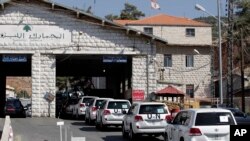International inspectors have arrived in Syria to begin the task of verifying and destroying President Bashar al-Assad's chemical weapons arsenal.
A convoy of about 20 vehicles crossed the border from neighboring Lebanon Tuesday en route to Damascus where the team will begin its complex mission of finding, dismantling and destroying an estimated 1,000-ton chemical arsenal.
The operation to rid Syria of chemical weapons by a target date of mid-2014 will be one of the largest and most dangerous of its kind. It is the shortest deadline that experts from the Organization for the Prohibition of Chemical Weapons have ever faced in any nation, and their first mission in a country at war.
The arsenal is believed to include sarin, mustard gas and other banned chemicals stored at an estimated 45 sites across the country.
The inspectors' priority is to achieve the first milestone of helping Syria scrap its ability to manufacture chemical weapons by a November 1 deadline, using every means possible.
That could include smashing mixing equipment with sledgehammers, blowing up delivery missiles, driving tanks over empty shells or filling them with concrete, and running machines without lubricant so they seize up and become inoperable.
The U.N. Security Council passed a resolution last week ordering Syria to comply with the OPCW's disarmament plan and to give inspectors free access to all sites they deem important for that mission.
Syrian Foreign Minister Walid al-Moallem said Monday his government will fully comply with the council resolution.
Some information for this report was provided by AP, AFP and Reuters.
A convoy of about 20 vehicles crossed the border from neighboring Lebanon Tuesday en route to Damascus where the team will begin its complex mission of finding, dismantling and destroying an estimated 1,000-ton chemical arsenal.
The operation to rid Syria of chemical weapons by a target date of mid-2014 will be one of the largest and most dangerous of its kind. It is the shortest deadline that experts from the Organization for the Prohibition of Chemical Weapons have ever faced in any nation, and their first mission in a country at war.
The arsenal is believed to include sarin, mustard gas and other banned chemicals stored at an estimated 45 sites across the country.
The inspectors' priority is to achieve the first milestone of helping Syria scrap its ability to manufacture chemical weapons by a November 1 deadline, using every means possible.
That could include smashing mixing equipment with sledgehammers, blowing up delivery missiles, driving tanks over empty shells or filling them with concrete, and running machines without lubricant so they seize up and become inoperable.
The U.N. Security Council passed a resolution last week ordering Syria to comply with the OPCW's disarmament plan and to give inspectors free access to all sites they deem important for that mission.
Syrian Foreign Minister Walid al-Moallem said Monday his government will fully comply with the council resolution.
Some information for this report was provided by AP, AFP and Reuters.





